“Understanding How to Use Kabutan, a Essential Tool for Japanese Stock Investors”
One of the methods to generate profits in the stock market is through “growth stock investment”. As a general principle, the stock prices of companies that continue to increase their sales and profits tend to rise. Investing in stocks of companies that show continuous growth and riding on the wave of their expansion is the essence of growth stock investment.
To invest in stocks that continue to grow, it is necessary to meticulously examine the financial figures of companies in every earnings report to confirm their growth. While checking the performance of a few stocks might not be too labor-intensive, it becomes a daunting task when dealing with over 3,000 stocks listed on the Tokyo Stock Exchange. If one were to perform this task during the earnings season, it could easily take up to 100 hours.
To expedite this 100-hour task, Kabu.com proves to be invaluable. With Kabu.com, what would take 100 hours can be reduced to just 20 hours, making the process significantly more efficient.
How to Check Financial Performance on Kabu.com:
①Enter the 4-digit stock code in the search box on the homepage.↓
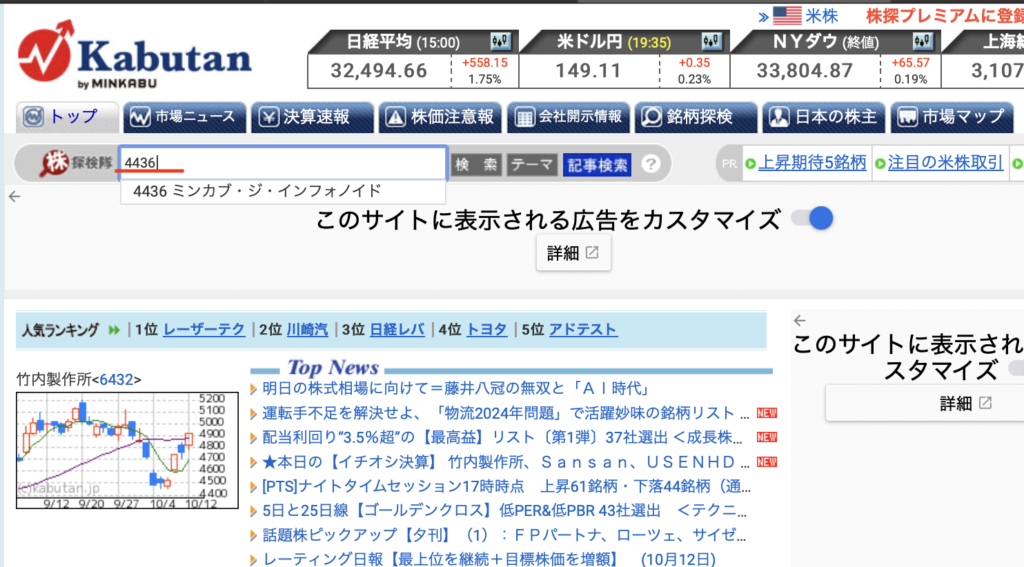
②Click on the ‘決算(Earnings)’ tab.↓
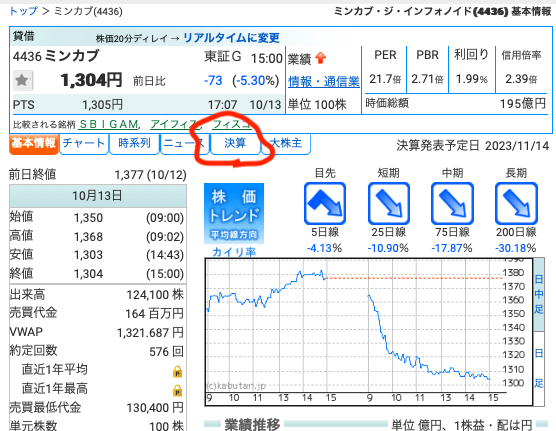
You can now view the individual stock’s financial performance information.↓
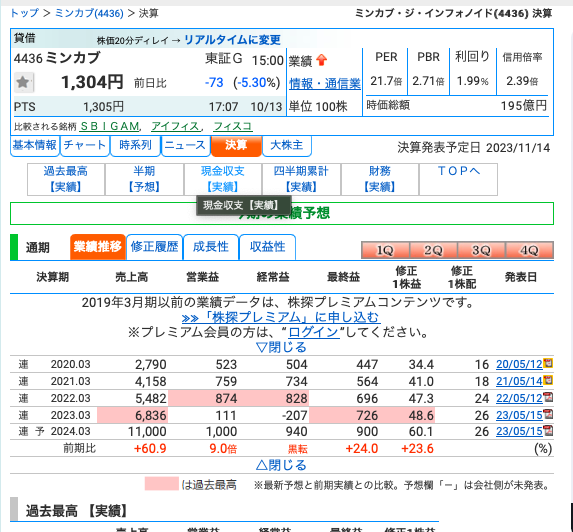
Best Times to Use Kabutan
①When Earnings Reports Are Released
②When Performance Revisions Are Announced
③When You Want to Confirm Suitability During Market Transitions
How to Use Kabutan
①When Earnings Reports Are Released
Review quarterly earnings figures.↓
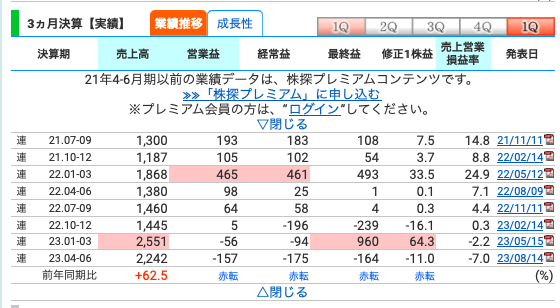
決算期=Fiscal Year
売上高=Revenue/Sales
営業益=Operating Profit
経常益=Ordinary Profit
最終益=Net Profit
1株益=Earnings per Share (EPS)
売上高営業損益率=Operating profit margin
発表日=Earnings Release Date
前年同期比=Year-on-Year (YoY)
黒転=Turn to Profit
赤転=Turn to Loss
ログイン=Login
Check if the numbers have increased compared to the same period last year.
Verify if the numbers have improved from the previous quarter.
Assess the progress rate concerning the forecasted figures.
Note that seasonal fluctuations in numbers might occur based on the industry; consider this factor.
If the numbers seem irregular, open the financial statements and read through the correction sections.
②When Performance Revisions Are Announced
Review revisions in annual performance forecasts.↓
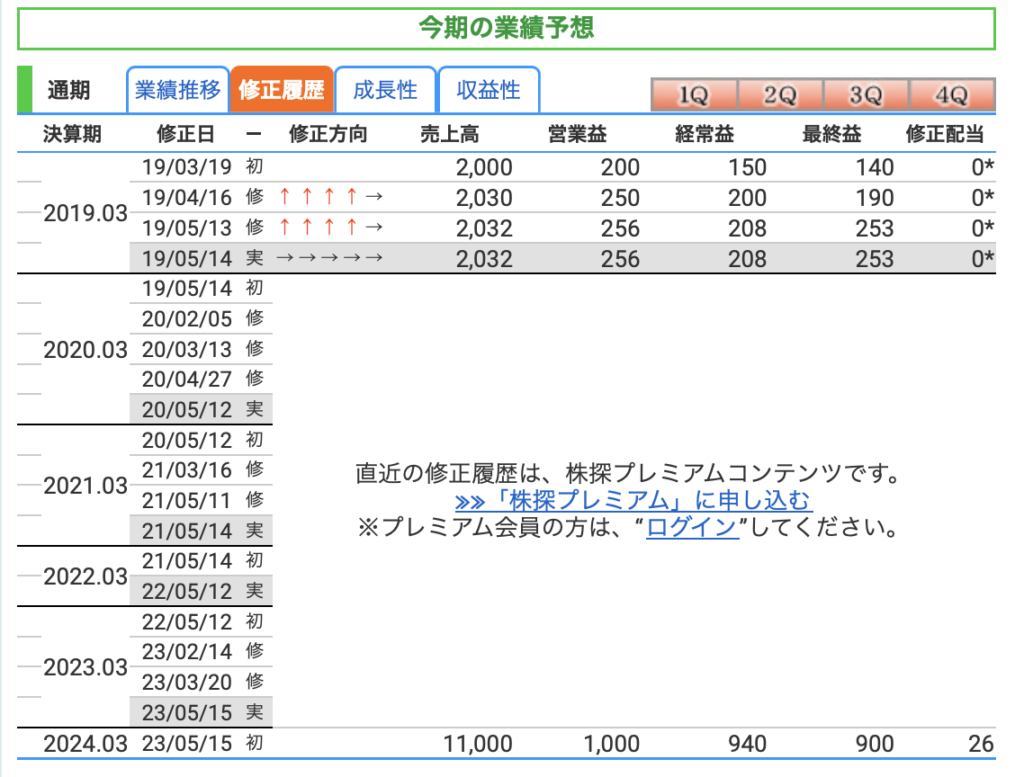
Examine revisions in semi-annual forecasts.↓

Determine the extent of the revisions made.
Assess whether the initial performance forecasts were optimistic or pessimistic.
Based on the performance forecast figures, you might anticipate the numbers for the next quarterly earnings.
上期業績=First-Half Performance
下期業績=Second-Half Performance
半期=Semi-Annual
修正=Revision
履歴=History
配当=Dividend
③When You Want to Confirm Suitability During Market Transitions
uring changes in the market’s macro trends, especially when there are anticipations of shifts in growth stocks being bought or sold, you can reevaluate which stocks qualify as growth stocks.
Recommendation for the Premium Plan
If you’re truly committed to investing in stocks for the long term and are willing to invest around 3,000 yen monthly, I believe opting for the premium plan is a good decision.
For growth stock investments, the premium plan proves invaluable in the following aspects.
Understanding the Impact of Revised Values. You can gauge the impact of revised values, understanding how significant these changes are.↓

Analyzing Seasonality and Growth over Five Years of Quarterly Earnings. You have access to five years’ worth of quarterly earnings, allowing you to confirm seasonality and growth trends.↓
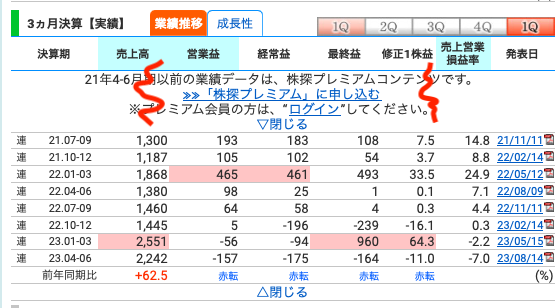
While there are various other features such as the ability to track dividends, profitability, and progress over time, the premium plan’s real value for growth stock investments lies in these two aspects.
Summary
In the Japanese stock market, companies announce their earnings quarterly. By inputting stock codes into Kabutan and familiarizing yourself with the performance data each time earnings are announced, your overall understanding of the market is bound to improve significantly. I highly encourage you to make the most out of this resource.



